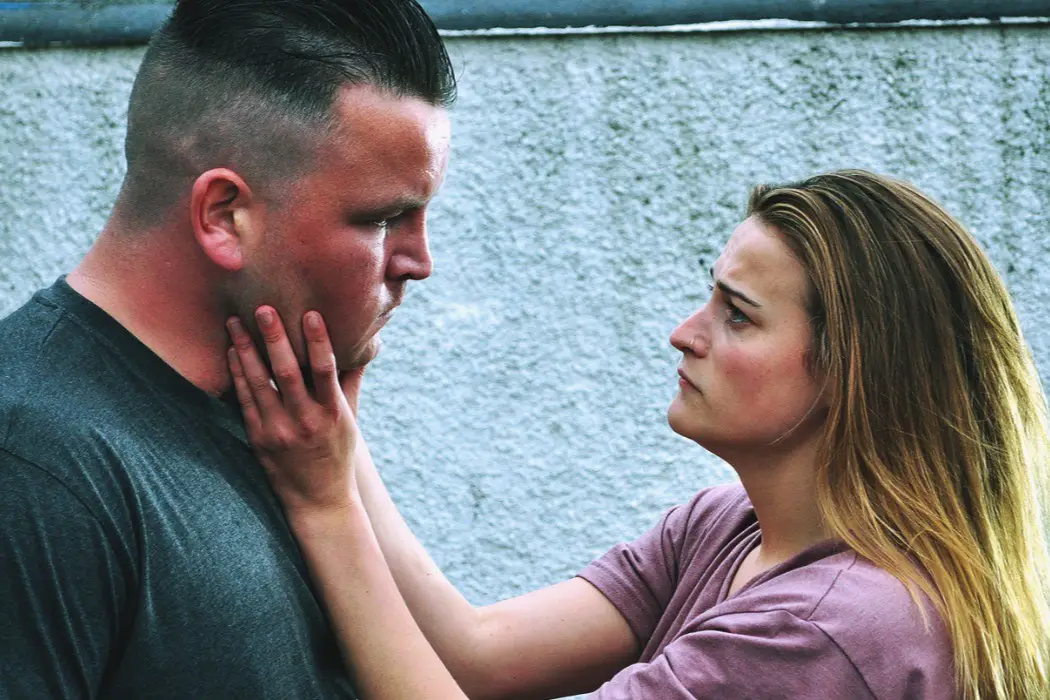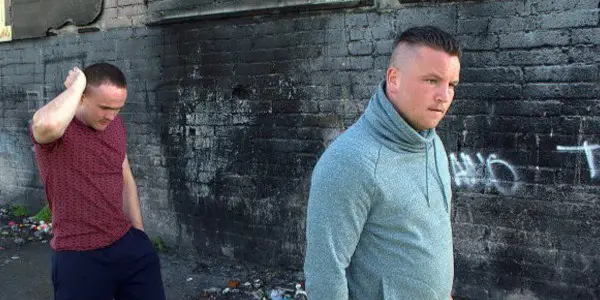CARDBOARD GANGSTERS: Irish Crime Thriller Is Brutally Effective

Lives by the sea in south-east England, with his wife,…
I’m not saying Cardboard Gangsters is the most nihilistic film I’ve ever seen, but it makes Brian De Palma‘s Scarface look like The Greatest Showman.
On the surface, Mark O’Connor’s fourth feature is a smorgasbord of macho, testosterone-fuelled violence – with rampant drug use and rough sex thrown in for good measure – but dig a little and there’s complexity and surprising humanity. It’s also one of the most searingly authentic pieces of work I’ve seen in a very long time.
Not fake nor phoney
The movie’s star and co-writer John Connors became internet famous a few weeks ago when his moving acceptance speech for Best Actor at IFTA18 (Irish Film and Television Academy awards) went viral. I’d been aware of his and director O’Connor‘s movie for a while but, working on the assumption any film with the word “Gangsters” in its title was certain to involve faux c*ckney hardmen prattling on about “shooters” and the Kray twins, had given it a wide berth. More fool me, because there is nothing about Cardboard Gangsters that is fake or phoney in any way.

Set in the rundown Darndale area of Dublin (nicknamed ‘The Jungle’), it focuses on Connors‘ Jason, and his “gang”, including the mouthy, mercurial Dano (Fionn Walton). Friends since childhood, over the years the lads have gone from hanging about harmlessly on their estate to low-level drug dealing and other criminal acts. Down on his luck, after getting work as a DJ messes up his government benefits, Jason decides it’s time to take things up a notch from pushing pills and weed to dealing heroin. It’s an escalation that brings the gang into direct conflict with the area’s local drugs kingpin, Derra (Jimmy Smallhorne), a situation hardly helped by Jason’s attraction to the older man’s partner, Kim (played by the perennially underrated Kierston Wareing).
Thrilling momentum
It’s a simple idea and this kind of “turf war” scenario is one we’ve seen before. But the secret to what makes Cardboard Gangsters so special is the way it builds over its 90-minute running time. The film takes place over no more than a few weeks, but every scene sees the stakes raised in ways both big and small. Hissed threats and theft lead to heated confrontations, which quickly become acts of violence, and you soon realise no one is going to come out of this unscathed. Or possibly even alive. None of them will back down, no one wants to lose face, everyone demands a respect they have done little to earn. It’s as if the die has been cast in the film’s first few minutes and no one is willing or able to apply the brakes. It lends proceedings a thrilling momentum – an urgency that grabs you by the throat.
It would be easy to watch Cardboard Gangsters and hammer out a thousand words on how the film is about toxic masculinity, but you’d be missing a big chunk of the point if you did. First and foremost, this is about class or, rather, an underclass of men and women that society has no real use for. People who don’t fit. Those at the bottom of the heap, left to fester in their own lack of opportunities by politicians and authorities that simply don’t care about them. Jason, his friends and his family have very little and the only way for them to survive is to fight for it. If that involves engaging in criminality, so be it.

There’s little solidarity here, everyone battling everyone for a piece of a pie that is tiny enough in the first place. Yes, like Scarface, Cardboard Gangsters is a nihilistic crime story, but that’s where the comparison ends. None of these characters have any chance of living in a mansion or driving around in a Porsche – even Derra. All Jason wants to do is escape to a new life in Marbella, but it might as well be Narnia for all the chance he has. The world is yours? You must be joking.
Death spiral
As a title, Cardboard Gangsters may inadvertently evoke all things Lock, Stock And Two Smoking Barrels but it’s a perfect fit here nonetheless. O’Connor goes to great lengths to show just how fragile and out of their depth these young men (all in their twenties) really are. The way they dress, the way they walk and move, the fact they all hang out at a local playground (“I’m going home for me tea”), underlines they are still little more than kids. The consequences – emotional and physical – of the violent acts they both commit and suffer only become apparent to them when it’s too late, and events have taken on a horrifying life of their own. These are not cheeky-chappie geezer gangsters having a laugh. These are desperate people, locked into a death spiral, if only they would realise it.
O’Connor finds a way of humanising all his characters. Derra, for all his myriad faults, isn’t beyond redemption. We see him fastidiously decorating a grave with white stones for his dead dog in one scene, offering Jason a way out of their rivalry a few minutes later. He’s a rotten, violent bastard but there are shades of grey. In fact, if there’s a villain of the piece it’s Dano, Jason’s cartoonish sidekick. A man who has watched too many episodes of The Sopranos, listened to too much bad gangster rap, and now labours under the delusion he’s a badass, complete with poorly tattooed guns on his scrawny pecs. He’s like the devil at Jason’s ear, urging him on to greater acts of violence and criminality, while refusing to take responsibility for the misery that occurs as a result.
Unnerving intensity
The film doesn’t try to hide what’s in its DNA: early Scorsese (bit of Mean Streets, splash of Taxi Driver), De Palma, Alan Clarke, Boyz N The Hood, The Wire, maybe a slice of Trainspotting. Conners has the unnerving intensity of Ray Winstone‘s borstal-boy Carlin in Scum (1979), matched with the pitbull physique of Michael Chiklis‘s rogue cop Vic Mackey from The Shield. He’s a disconcerting, charismatic screen presence.

But as he proved in previous collaborations with O’Connor – King Of The Travellers and Stalker (both 2012) – there’s a lot more to Connors than playing the tough guy. There’s a scene near the end where Jason smashes up his bedroom in a rage born of grief, fear and self-loathing before falling, sobbing into his mother’s arms. It’s the film’s pivotal moment because, for the first and only time, we see him for what he truly is: a boy trying to be a man but not for one minute really understanding what that means. His meltdown is visceral, primal, and utterly bloody heart-rending.
Impressive eye
O’Connor has learned some useful lessons from his influences and has an impressive eye for a visual. The stagnant lake we see right at the beginning of the film is a powerful metaphor for the lives of pretty much everyone in Cardboard Gangsters, while a ‘Bless This Home’ plaque on Derra’s front door made me laugh out loud. And the fact Jason has a poster of Mike Tyson (the fallen anti-hero’s fallen anti-hero) on his bedroom wall is almost too perfect. Meanwhile, O’Connor’s repeated use of passenger planes zipping through the sky is an overfamiliar but effective representation of escape and hope.
Shot on the smallest of budgets (400,000 euros, which it took three years to raise), Cardboard Gangsters is rough around the edges, but you wouldn’t want it any other way. Polishing this film too much would undermine its gritty, no-frills swagger. O’Connor shoots a lot of it vérité style, most memorably in a couple of montages which see Darndale kids tearing up and down the street on dirt bikes and one lad galloping a horse across a patch of grass. It’s all soundtracked by some impressive home-grown Irish hip-hop, although it’s probably Damien Dempsey’s soulful, stirring “Serious” that is the stand-out song.
Cardboard Gangsters: In conclusion
O’Connor’s film was the biggest Irish-made box-office hit of 2017 in his home country and earned a small but critically well-received run in the UK just after. It explores themes similar to the director’s previous films, King Of The Travellers, Stalker, and Between The Canals, and, like them, persuasively evokes the lives of marginalised people. Not only is Cardboard Gangsters his most successful outing to date, but, for a few days after first seeing the film, it was difficult to watch another movie because everything else felt so ridiculously polite in comparison.
What is your favourite gangster film and why? Tell us your thoughts in the comments below!
Cardboard Gangsters is now showing on Netflix UK . For all international release dates, see here.
Does content like this matter to you?
Become a Member and support film journalism. Unlock access to all of Film Inquiry`s great articles. Join a community of like-minded readers who are passionate about cinema - get access to our private members Network, give back to independent filmmakers, and more.
Lives by the sea in south-east England, with his wife, kids and cats. You are cordially invited to check out his film and comics-flavoured website - andywinter.online - and follow him on Twitter @andywinter1













